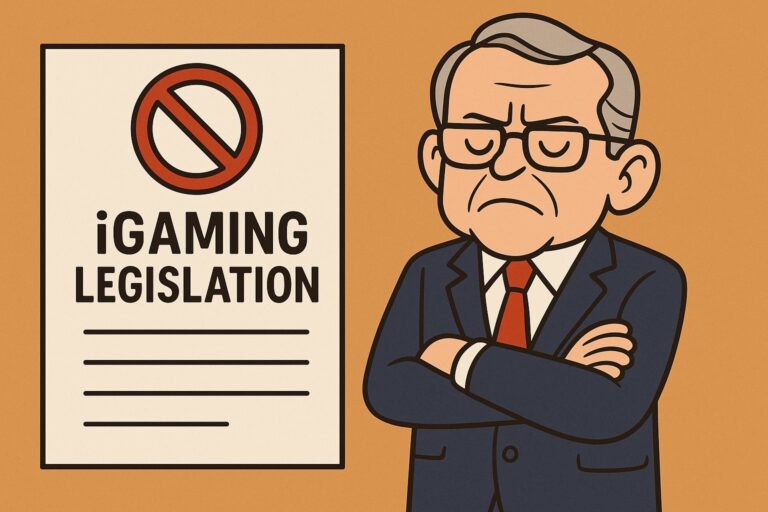
Ohio Gov. Mike DeWine has made clear his opposition to legalizing online casino gaming, or iGaming, in Ohio, citing serious concerns about addiction, especially among youth, and the social consequences of 24/7 mobile gambling access.
Speaking to reporters at the Ohio State Fair, DeWine stated, “I’m not for it … to put a casino in everybody’s hands, 24‑7, I think is probably not a great idea and I think it will cause more pain and suffering … as far as gaming addiction.”
While he did not directly commit to vetoing an iGaming bill, he left little doubt about his position, saying, “I’m very much against this. … I’m not going to usually use the ‘V’ word, but I’m very much against this.”
Concern Over Addiction and Accessibility
DeWine’s core objection lies in the accessibility of online gambling, which he believes dramatically increases the potential for compulsive behavior. He pointed to mobile devices as creating a “casino in every pocket,” raising the stakes for gambling-related harm in households across Ohio.
The governor emphasized the risk to younger users in particular, noting the psychological and financial damage that can result from unchecked gambling behavior.
Legislative Push for iGaming
Despite DeWine’s stance, lawmakers in both chambers of the General Assembly are pressing forward with proposals to legalize iGaming. Two active bills represent distinct approaches:
-
Senate Bill 197, sponsored by Sen. Nathan Manning, would legalize online casino games, poker, iLottery, and horse racing wagers. It proposes: licensing for existing casinos and racinos, along with weekly spending limits for users.
- House Bill 298 is a more targeted bill that focuses solely on online slot and table games.
Some lawmakers are exploring ways to direct revenue from iGaming toward public services such as infrastructure or mental health initiatives, in an effort to win broader support and soften opposition.
Will DeWine’s Opposition Matter?
Gov. DeWine’s resistance to online casino legalization adds political friction but may not be decisive. With Republican supermajorities in both chambers, the Ohio legislature has the power to override a veto—though it remains unclear whether lawmakers are willing to challenge the governor directly.
DeWine’s stance could influence the shape of the legislation, prompting lawmakers to include stronger responsible gambling measures or funding for addiction services. It may also energize opposition from advocacy groups while motivating supporters to act swiftly before momentum fades.
Ultimately, while DeWine’s objections complicate the path forward, they don’t necessarily block it. The outcome will depend on how legislators balance political risks with the appeal of new revenue and regulatory control.
Stakeholders Divided on Legalization
The growing debate has drawn in a wide range of voices, including religious groups, casino operators, and responsible gambling advocates. Concerns about the social toll of gambling addiction continue to drive vocal opposition, especially from faith-based organizations.
Meanwhile, the casino industry itself is divided:
-
Jack Entertainment opposes iGaming, citing fears that it could reduce in-person casino visits.
-
Penn Entertainment supports the measure, arguing that digital gaming complements physical locations by reaching different types of players.
Budget Season Could Be a Flashpoint
With the state budget process underway, lawmakers are weighing whether to tie iGaming to broader fiscal legislation—potentially bypassing the governor’s approval. DeWine has previously supported using sports betting tax revenue for youth sports and stadium upgrades, but he has not shown the same interest in leveraging online casino revenue for public purposes.
As the debate continues, Ohioans can expect increased public discourse, lobbying, and legislative maneuvering around the issue. While the outcome remains uncertain, Gov. DeWine’s outspoken opposition has raised the political temperature and ensured that iGaming will be one of the most closely watched issues in the months ahead.
*This article was created by the author with help from AI tools. We use AI to organize complex info faster and assist in writing to ensure you get as much helpful info in as little time as possible. Every post is researched, reviewed, and edited by people who actually know their stuff.





